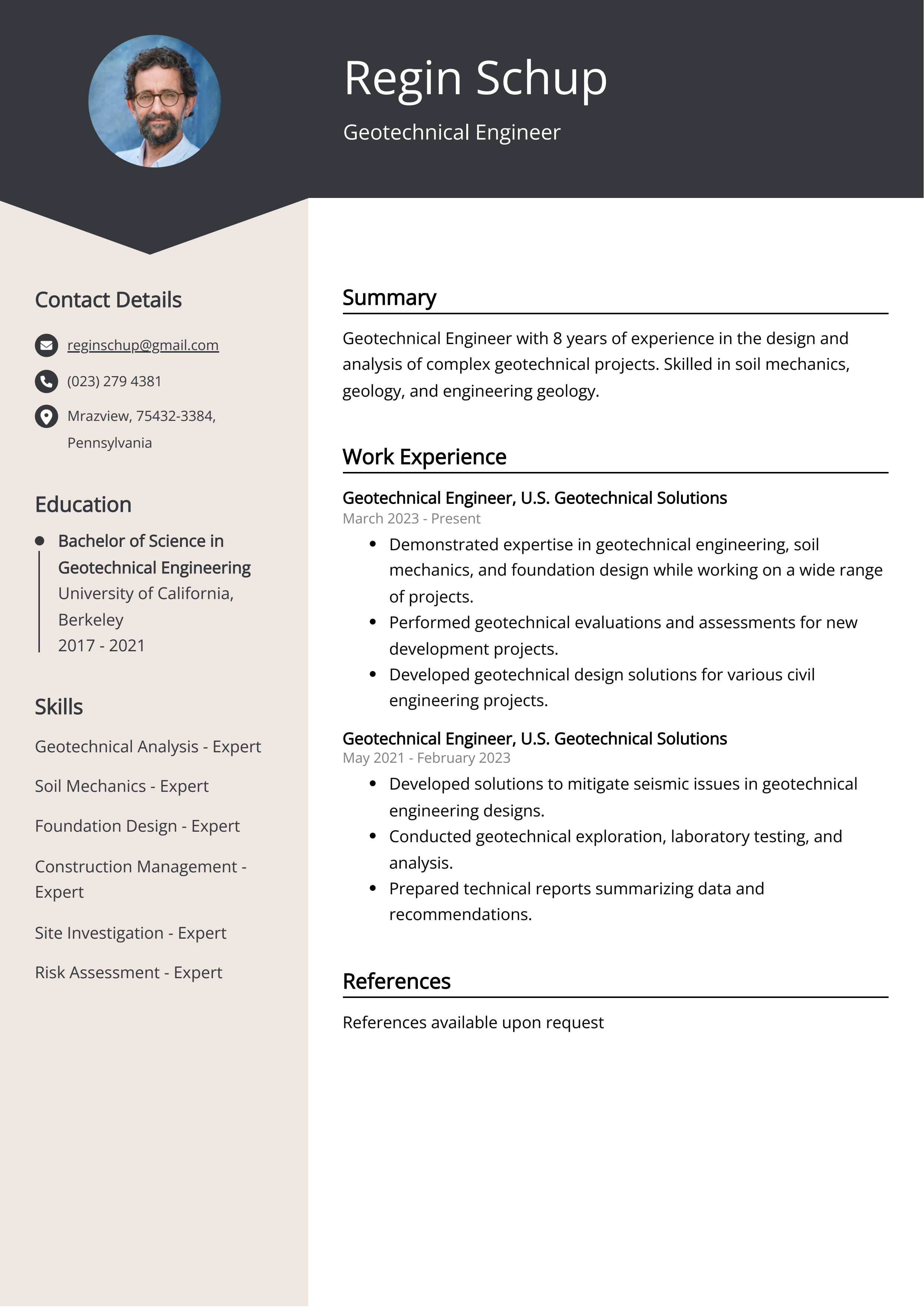Our Geotheta Statements
Our Geotheta Statements
Blog Article
5 Simple Techniques For Geotheta
Table of ContentsGeotheta - TruthsExcitement About GeothetaGeotheta Things To Know Before You Buy4 Simple Techniques For GeothetaIndicators on Geotheta You Should Know

They conduct site examinations, collect samples, perform lab tests, and examine information to review the suitability of the ground for building and construction jobs - Engineer of Record. Based upon their searchings for, geotechnical designers supply referrals for structure layout, incline stability, preserving frameworks, and reduction of geotechnical dangers. They team up with various other experts, such as designers, structural designers, and building teams, to ensure that geotechnical considerations are integrated right into the total job style and execution
By examining the actions and properties of dirt and rock, they can determine possible geotechnical threats such as landslides, dirt negotiation, or slope instability. Their experience assists stop failings or mishaps that could jeopardize lives and home. Below are some in-depth tasks and responsibilities of a geotechnical engineer: Site Examination: Geotechnical designers conduct website investigations to gather data on subsurface conditions.
They analyze the information to understand the homes and habits of the dirt and rock, including their toughness, leaks in the structure, compaction features, and groundwater problems. Geotechnical Analysis and Style: Geotechnical engineers evaluate the data accumulated throughout site investigations to assess the security and viability of the website for building projects. They do geotechnical calculations and modeling to evaluate factors such as bearing capacity, settlement, incline stability, lateral planet pressures, and groundwater flow.
Things about Geotheta
Structure Design: Geotechnical designers play a critical function in designing structures that can securely sustain the desired structure. They analyze the soil conditions and lots demands to identify the ideal structure kind, such as superficial foundations (e.g., grounds), deep foundations (e.g (https://disqus.com/by/geotheta/about/)., stacks), or specialized strategies like dirt improvement. They think about variables such as negotiation limitations, birthing capability, and soil-structure interaction to develop optimum foundation layouts
They assess building and construction plans, monitor site tasks, and carry out field inspections to verify that the design referrals are complied with. If unexpected geotechnical concerns emerge, they analyze the scenario and supply recommendations for remediation or adjustments to the style. Risk Evaluation and Reduction: Geotechnical engineers analyze geotechnical dangers and dangers associated with the task website, such as landslides, liquefaction, or soil disintegration.

Collaboration and Interaction: Geotechnical designers function closely with other experts associated with a task, such as designers, structural engineers, and construction groups. Efficient interaction and cooperation are crucial to incorporate geotechnical factors to consider into the total job layout and construction procedure. Geotechnical engineers supply technological competence, response questions, and guarantee that geotechnical needs are met.
The smart Trick of Geotheta That Nobody is Talking About
Here are some sorts of geotechnical designers: Foundation Engineer: Foundation designers focus on making and examining structures for structures. They examine the soil problems, lots requirements, and website qualities to identify one of the most proper structure kind and style, such as shallow structures, deep foundations, or specialized methods like pile foundations.
They review the aspects affecting incline stability, such as soil residential or commercial properties, groundwater problems, and incline geometry, and establish strategies to avoid slope failures and reduce risks. Quake Engineer: Earthquake designers concentrate on analyzing and developing frameworks to hold up against seismic forces. They assess the seismic danger of a website, assess dirt liquefaction possibility, and establish seismic style criteria to guarantee the safety and resilience of frameworks their website during quakes.
They carry out area screening, gather samples, and analyze the accumulated data to characterize the dirt homes, geologic formations, and groundwater conditions at a website. Geotechnical Instrumentation Engineer: Geotechnical instrumentation designers concentrate on monitoring and determining the actions of dirt, rock, and structures. They install and keep instrumentation systems that keep an eye on variables such as soil settlement, groundwater levels, slope motions, and structural variations to examine performance and supply early warnings of prospective concerns.
More About Geotheta
They perform tests such as triaxial tests, consolidation tests, straight shear examinations, and permeability tests to gather information for geotechnical analysis and design. Geosynthetics Designer: Geosynthetics designers concentrate on the design and application of geosynthetic materials, such as geotextiles, geogrids, and geomembranes. They make use of these products to improve dirt security, reinforce slopes, give drain solutions, and control erosion.
They often tend to be investigatory people, which suggests they're intellectual, reflective, and analytical. They are curious, systematic, reasonable, analytical, and sensible. Some of them are also social, implying they're kind, generous, cooperative, client, caring, valuable, compassionate, skillful, and friendly. Does this seem like you? Take our totally free occupation test to figure out if geotechnical designer is just one of your leading career matches.
In the workplace environment, geotechnical designers make use of specialized software devices to execute calculations, create layouts, and examine data. They prepare records, testimonial project specs, interact with customers and group members, and coordinate task activities. The workplace setup provides a helpful atmosphere for research study, evaluation, and partnership with other specialists included in the job.
The Basic Principles Of Geotheta
They regularly go to task websites to conduct site investigations, examine geotechnical conditions, and collect information for evaluation. These sees include taking a trip to various locations, in some cases in remote or challenging terrains. Geotechnical engineers might perform dirt sampling, conduct examinations, and monitor building and construction activities to make sure that the geotechnical elements of the job are being applied correctly.
Geotechnical designers likewise operate in specialized geotechnical labs. In these centers, they carry out experiments, execute tests on dirt and rock examples, and assess the engineering residential or commercial properties of the products. Geotechnical lab designers function thoroughly in these environments, managing testing tools, operating tools, and tape-recording information. They collaborate with various other laboratory staff to make certain accurate and trustworthy screening results.
Report this page